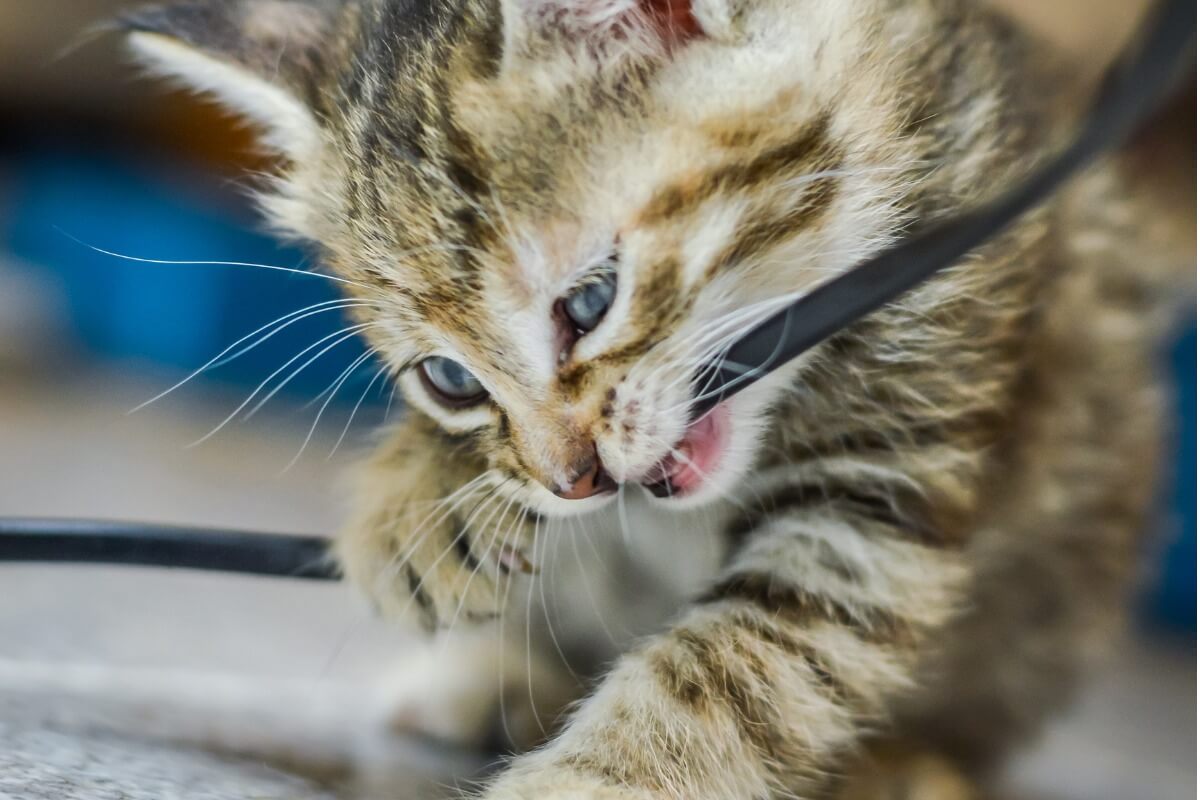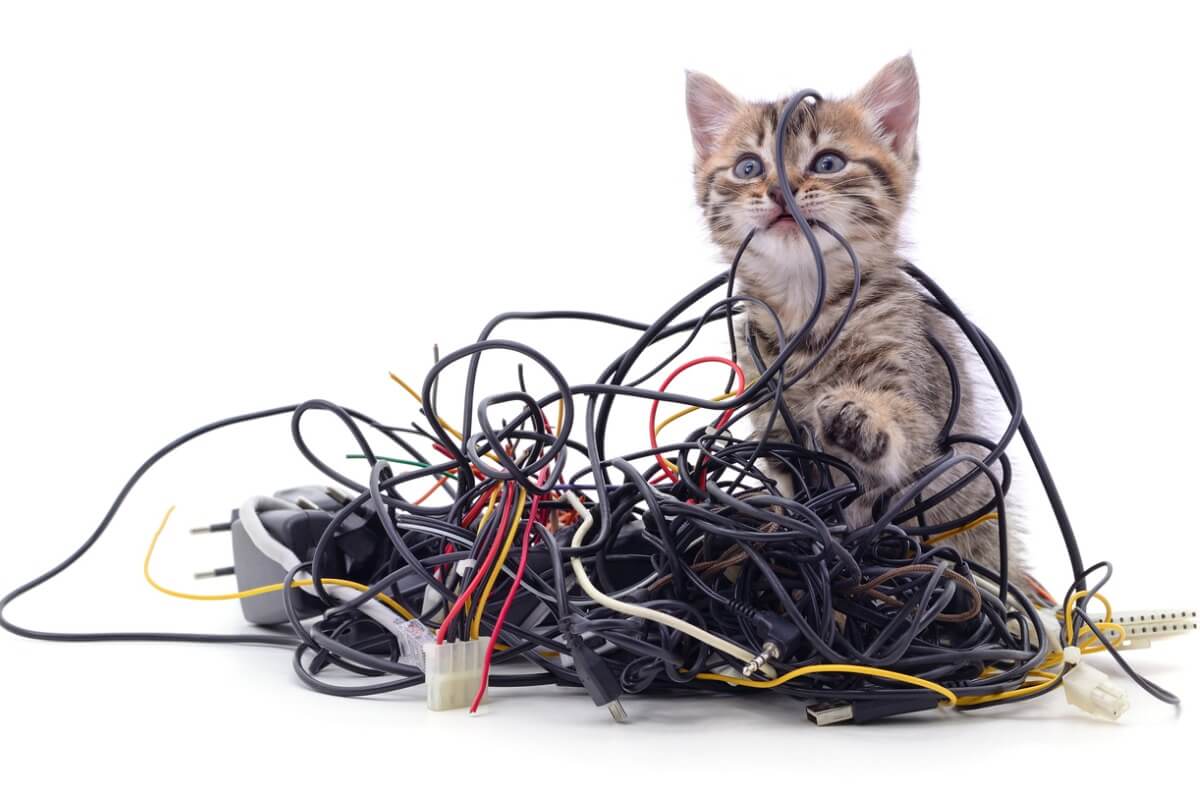How to Stop Your Cat from Chewing on Cables

Preventing your cat from chewing on cables isn’t only necessary to prevent the destruction of household goods, but also to keep your pet safe. It is a habit that can often injure the cat, but, in the worst case scenario, could even cause its death or a fire.
But why this habit of chewing cables? To find the best solutions to this behavioral problem, the first thing to do is to answer this question. Don’t miss this important article.
Why do cats chew cables?
Finding chewed charger or computer cables, or even appliances is a constant frustration in some homes. It’s even worse when you find that the appliance isn’t working anymore. Cats seem to love anything that dangles or resembles an animal’s tail, as it awakens their hunting instinct.
However, the first step in preventing a cat from chewing on household cables is to identify why they do it. It isn’t always a game, because this act may be caused by one of the problems we’ll mention below:
- Dental problems: When cats have a problem in their mouth that causes them pain, they’ll chew on wires to relieve it.
- Boredom: A feline that doesn’t have enough stimulation in its environment will look for ways to entertain itself. Wires or cables in plain sight are an attractive option for some cats who don’t have much to do at home.
- Health problems: Some illnesses or diseases, such as hyperthyroidism, increase the animal’s activity and appetite, which translates into chewing on everything within reach. Other animals with reduced mobility may play with whatever is within reach, as in the case of osteoarthritis patients.
- Pica: Pica disorder is the ingestion of non-food and unusual substances. This usually occurs due to behavioral disorders or nutritional deficits, in which the feline seeks atypical food to make up for them.
- Obsessive behavior: Stress and anxiety lead any animal to seek ways of relief through compulsive behavior. In the case of cats, this can take the form of chewing and breaking wires.
Finding the cause of this problem (even knowing the most common reasons) is tricky. It’ll mean you getting to know your feline in depth and knowing what environmental factors stress them out, in addition to checking its health periodically.

How to stop your cat from chewing on cables at home
The procedure is simple: once you discover what drives your cat to bite cables, you’ll have to eliminate the cause and implement a solution in order to stop this behavior. To do this, here are a few tips:
- Use home remedies: There are very effective homemade mixtures to give the wires an unpleasant taste. Spicy or sour scents often work quite well, but make sure you don’t use anything that could be toxic to your feline.
- Use wireless technology whenever possible.
- Cover the cables with PVC cable protectors: There are specialized pet protectors available on the market. Plus, these tubes are often useful for tidying up places with lots of electrical cords, which is also a fire prevention method.
- Hide the cables directly: Behind furniture, tucked away in inaccessible corners, and so on. Cables and wires that snake along the floor and those that hang down are the most conspicuous to felines.
- Offer safe alternatives to your cat: If they don’t ingest the things they chew, you can give them other objects to amuse themselves with, such as cardboard or specialized toys.
- Enrich your cat’s life: Keeping your household feline entertained will not only prevent behavioral problems, but you’ll be able to enjoy quality time with him.
Working on the cat’s behavior is a good complement to help to change its environment. For very active felines, the reward can come in the form of high-activity games. By doing so, it won’t be so attracted to wires and cables.
Is it good to punish cats to prevent them from chewing wires?
Many people use the method of punishment at a distance (such as the typical jet of water), but from the point of view of positive training, this isn’t a very good strategy. Firstly, because the cat won’t stop its behavior when you’re not there in the house, and, secondly, because electricity and water have never got on well!
Somendeterrents are very useful in modifying behavior, such as devices that emit a hissing sound when the cat approaches. On the other hand, you can firmly order your pet to stay away and, when they listen to you, reward them. However, the best method is always to provide the cat with adequate environmental enrichment and prevent them from accessing the cables in the first place.

Finally, don’t forget to take your cat to the veterinarian to rule out any underlying diseases that may be causing this behavior. In addition, a feline ethologist will be a great help in solving behavioral problems and eliminating potential sources of stress.
Preventing your cat from chewing on cables isn’t only necessary to prevent the destruction of household goods, but also to keep your pet safe. It is a habit that can often injure the cat, but, in the worst case scenario, could even cause its death or a fire.
But why this habit of chewing cables? To find the best solutions to this behavioral problem, the first thing to do is to answer this question. Don’t miss this important article.
Why do cats chew cables?
Finding chewed charger or computer cables, or even appliances is a constant frustration in some homes. It’s even worse when you find that the appliance isn’t working anymore. Cats seem to love anything that dangles or resembles an animal’s tail, as it awakens their hunting instinct.
However, the first step in preventing a cat from chewing on household cables is to identify why they do it. It isn’t always a game, because this act may be caused by one of the problems we’ll mention below:
- Dental problems: When cats have a problem in their mouth that causes them pain, they’ll chew on wires to relieve it.
- Boredom: A feline that doesn’t have enough stimulation in its environment will look for ways to entertain itself. Wires or cables in plain sight are an attractive option for some cats who don’t have much to do at home.
- Health problems: Some illnesses or diseases, such as hyperthyroidism, increase the animal’s activity and appetite, which translates into chewing on everything within reach. Other animals with reduced mobility may play with whatever is within reach, as in the case of osteoarthritis patients.
- Pica: Pica disorder is the ingestion of non-food and unusual substances. This usually occurs due to behavioral disorders or nutritional deficits, in which the feline seeks atypical food to make up for them.
- Obsessive behavior: Stress and anxiety lead any animal to seek ways of relief through compulsive behavior. In the case of cats, this can take the form of chewing and breaking wires.
Finding the cause of this problem (even knowing the most common reasons) is tricky. It’ll mean you getting to know your feline in depth and knowing what environmental factors stress them out, in addition to checking its health periodically.

How to stop your cat from chewing on cables at home
The procedure is simple: once you discover what drives your cat to bite cables, you’ll have to eliminate the cause and implement a solution in order to stop this behavior. To do this, here are a few tips:
- Use home remedies: There are very effective homemade mixtures to give the wires an unpleasant taste. Spicy or sour scents often work quite well, but make sure you don’t use anything that could be toxic to your feline.
- Use wireless technology whenever possible.
- Cover the cables with PVC cable protectors: There are specialized pet protectors available on the market. Plus, these tubes are often useful for tidying up places with lots of electrical cords, which is also a fire prevention method.
- Hide the cables directly: Behind furniture, tucked away in inaccessible corners, and so on. Cables and wires that snake along the floor and those that hang down are the most conspicuous to felines.
- Offer safe alternatives to your cat: If they don’t ingest the things they chew, you can give them other objects to amuse themselves with, such as cardboard or specialized toys.
- Enrich your cat’s life: Keeping your household feline entertained will not only prevent behavioral problems, but you’ll be able to enjoy quality time with him.
Working on the cat’s behavior is a good complement to help to change its environment. For very active felines, the reward can come in the form of high-activity games. By doing so, it won’t be so attracted to wires and cables.
Is it good to punish cats to prevent them from chewing wires?
Many people use the method of punishment at a distance (such as the typical jet of water), but from the point of view of positive training, this isn’t a very good strategy. Firstly, because the cat won’t stop its behavior when you’re not there in the house, and, secondly, because electricity and water have never got on well!
Somendeterrents are very useful in modifying behavior, such as devices that emit a hissing sound when the cat approaches. On the other hand, you can firmly order your pet to stay away and, when they listen to you, reward them. However, the best method is always to provide the cat with adequate environmental enrichment and prevent them from accessing the cables in the first place.

Finally, don’t forget to take your cat to the veterinarian to rule out any underlying diseases that may be causing this behavior. In addition, a feline ethologist will be a great help in solving behavioral problems and eliminating potential sources of stress.
All cited sources were thoroughly reviewed by our team to ensure their quality, reliability, currency, and validity. The bibliography of this article was considered reliable and of academic or scientific accuracy.
- Chadwin RM, Bain MJ, Kass PH. Effect of a synthetic feline facial pheromone product on stress scores and incidence of upper respiratory tract infection in shelter cats. J Am Vet Med Assoc, vol. 251 no. 4, pp. 413-420, 2017. doi:10.2460/javma.251.4.413
- Unusual Eating Habits in Dogs and Cats. University of California at Davis Veterinary Medicine.
- Feline Behavior Problems: Destructive Behavior. Cornell Univeristy Feline Health Center.
This text is provided for informational purposes only and does not replace consultation with a professional. If in doubt, consult your specialist.








